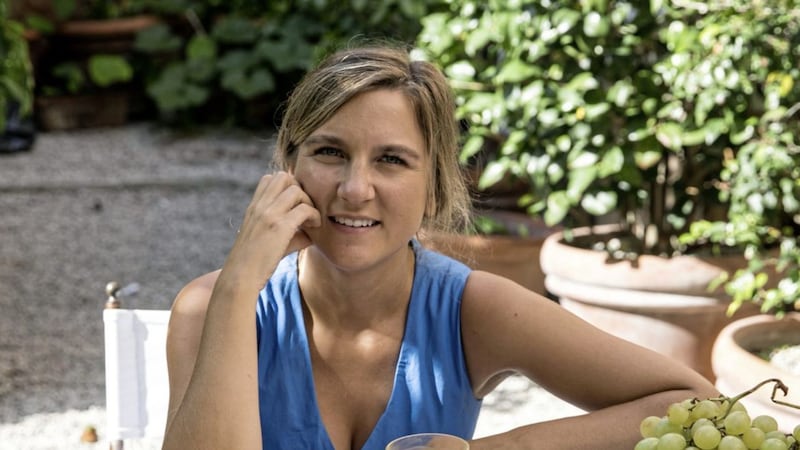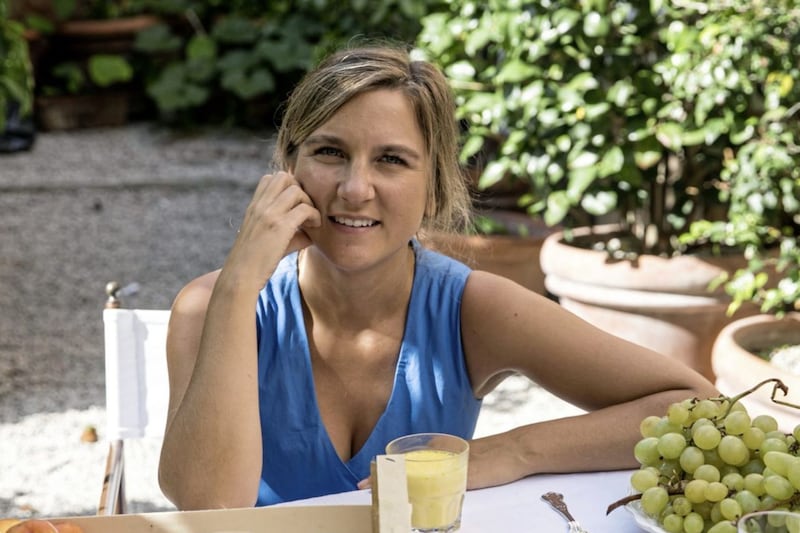MANY of us claim Italian to be our favourite cuisine – and what's not to like, with all the pasta and red wine? However, this is a slightly one-note view of the country's food. London-born Skye McAlpine grew up in Venice, and is on a mission to introduce people to true Venetian cooking, in all its variety-filled glory.
Although she's not a professionally trained chef, McAlpine's recipes have won huge popularity as lovingly formed slices of Italian life.
Her food journey started with a blog, From My Dining Table, which has now been transformed into a new cookbook, called A Table In Venice.
She is obsessed with poring over cookbooks like they were novels, but it was only when she was doing her PhD that she started writing about food herself.
"I really enjoyed my PhD in 17th and 18th century English translations of Latin love poetry, but it was a real conversation killer at dinner parties," she says with a giggle. "What was so lovely about writing about food is that it's a fantastic way to connect with pretty much everyone, because everyone eats."
This "personal connection" is why McAlpine first started her blog back in 2014, and her warm writing, as well as her recipes, has won a legion of fans.
She and her husband Anthony, and their toddler son Aeneas, now split their time between London, where McAlpine was born, and Venice where she grew up.
She does all her own food photography too – ever the student, McAlpine swotted up on food photography and styling and invested in a decent camera. What makes her images even more endearing is that all the photography is done in her Venetian kitchen, which naturally has much more character than a studio.
This adds to the homely, welcoming feel of the book – and indeed her whole approach to food – too. "It's a big rambling house, and it's very Italian of us to have three generations living there at one time," McAlpine adds.
Perhaps unsurprisingly from someone who did a PhD in Latin love poetry, McAlpine is preoccupied with the history of Italian food – something which is sharpened by the surroundings of Venice.
"Because it's such a crumbling and old city, it does encourage you to focus on the history," she says. "If you love history and stories like I do, Venice is like a massive toy box full of wonders to play with."
This feeds into the recipes that she has created, such as her favourite breakfast of kiefer – almond paste croissants that became part of Venetian cuisine during the early 19th century Austrian occupation.
So what sets Venetian cuisine apart from other areas in Italy?
"Italian food is usually very fresh and simple flavours, so what's most interesting about Venetian food is its unusual use of spices," McAlpine explains.
"Because of Venice's history as the top of the spice route and a melting pot of cultures, there is a lot of spice – cardamom, cinnamon, pink peppercorns, bay leaves and saffron – all these flavours run through otherwise quite plain and simple dishes, which I think is really nice."
Having roots in two different countries has given McAlpine a fresh take on Venetian cuisine.
"If you grow up in Italy, you have a very strong sense that there is a right and a wrong way to eat things. Whereas Anglo-Saxon culture is much more adventurous, and we get more excited by fusion and blurring the lines and exciting new ways of using things," she says.
This means that while McAlpine is strictly Italian in some senses (you won't in a million years find her eating pasta with chicken), she's more open to experimentation in others – she tells a hilarious story of a fruit seller's horror when he found out she was making a distinctly untraditional apple, rose and thyme tart.
"That is the weird thing when you come from one place and live in another," she says. "I've never known any different because I grew up that way, but I think it is nice to have multiple cultures, so I get to pick and choose."
As for her advice to anyone wanting to dip their toe in Venetian cooking: "Start with what you like," she says simply. "I think that's best way to get excited, because we all have different tastes.
"Because I'm a completely self-taught home cook, and these are recipes I cook at home, they're all incredibly simple and quite intuitive."
:: A Table In Venice: Recipes From My Home by Skye McAlpine, is published by Bloomsbury, priced £26. Below are three recipes from the book for you to try.
LINGUINE WITH ASPARAGUS AND PROSECCO
(Serves 4)
1tbsn olive oil
1 small onion, chopped
400g asparagus, trimmed and cut into 3-5cm lengths
100ml Prosecco
A handful of flat-leaf parsley, roughly chopped
400g linguine
30g salted butter
30g Parmesan, grated
Sea salt and freshly ground black pepper
Method
Heat the olive oil in a large frying pan over a medium heat, then add the onion and a generous pinch of salt. Cook, stirring, over a low-medium heat for five to 10 minutes, until the onion becomes translucent. Add the asparagus and prosecco, then season with salt and pepper. Cook, stirring, for about five minutes, until all the liquid has evaporated and the asparagus is tender. If it is not quite done by the time the wine evaporates, add just enough water to cover the base of the pan and cook for a little longer. Stir in the parsley.
Meanwhile, cook the linguine in a large saucepan of generously salted boiling water until al dente. Just before you drain the pasta, scoop half a cup of the cooking water out of the pot and set to one side. Drain the pasta, toss it back into the saucepan and mix in the reserved cooking water, little by little, and the butter. Stir well, then add the asparagus mixture. Give everything one last good stir and top with the grated Parmesan.
ALMOND PASTE CROISSANTS
(Makes 10)
2 x 320g ready-rolled puff pastry sheets
1 large egg yolk, lightly beaten
30g flaked almonds
2tbsp icing sugar
For the filling:
90g ground almonds
70g caster sugar
1.5tsp apricot jam
A pinch of salt
1 large egg white, lightly beaten with a fork
Method
Heat the oven to 220C. To make the filling, put the ground almonds, sugar, jam and salt in a bowl and mix well. Add the egg white and stir until you have a thick paste, rather like marzipan.
Lay out the puff pastry sheets on a work surface and cut out five triangles from each one, 12-14cm wide at the base and 24cm long on the sides. Spoon a teaspoon of almond paste on to the base of each triangle, centred and about two-fingers' width away from the edge. Resist the urge to overfill here: you really just need a teaspoon, or the filling will spill out in the oven. Fold the bottom edge of the triangle over the filling, trying to tuck it under, and roll the pastry up as tightly as you can. Gently fold the tips under into the horns of a croissant, pinching where needed to seal. Repeat this with the remaining pastry triangles, then arrange them on a baking sheet lined with baking parchment.
Brush the croissants with the beaten egg yolk to glaze, then sprinkle liberally with the flaked almonds. Bake for 20 minutes, until golden all over. Remove the tray from the oven and sift the icing sugar generously over the piping-hot croissants, so that some of it melts into them. Let them cool slightly, then transfer to a wire rack. Eat warm o
(Serves 10-12)
ZABAIONE AND MERINGUE SEMIFREDDO
1/2 lemon
6 large egg whites
300g caster sugar
For the zabaione:
6 large egg yolks
100g caster sugar
70ml Marsala
300ml whipping cream
Method
Make the meringue layers first. Heat the oven to 140C. Line three large baking trays with baking parchment and draw a 24cm circle on each piece of paper. Turn the paper over so you can still see the lines and use them as guides.
Rub a large bowl down with the lemon half to cut through any grease. Put the egg whites into the bowl and, using a handheld electric mixer, beat on a low-medium speed until the whites begin to froth. Increase the speed to high and add the sugar a tablespoon at a time until the whites become glossy and form stiff peaks. Spoon the meringue onto the baking parchment and spread it out evenly within the circles.
Bake for 1 hour 10 minutes, then switch off the oven and leave the meringues in there, without opening the door, for an hour longer, until the oven has cooled. Take the meringues out of the oven and leave them to cool on the trays.
Now make the zabaione cream filling. Put the egg yolks and sugar into a heatproof bowl and whisk with a handheld electric mixer for two to three minutes, until light and fluffy. As the mixture begins to froth up, set the bowl over a pan of gently simmering water, making sure the water isn't touching the base of the bowl. Keep whisking until the mixture is thick enough for a trail to stay on the surface when drizzled from the whisk. Slowly pour in the Marsala, whisking all the while. This should take three to five minutes, and as you add the liquid, the zabaione will double in size and thicken. Remove the bowl from the heat and let the zabaione cool to room temperature, whisking occasionally to prevent a skin forming.
In a separate bowl, beat the whipping cream until it forms soft peaks. Gently fold it into the cooled zabaione. To assemble the semifreddo, place one of the meringue layers on a serving plate, and spread half the zabaione cream over it. Top with a second layer of meringue, then the rest of the zabaione cream, and finish with the final layer of meringue. Freeze for three to four hours, or longer if you like, until set. Slice like a cake to serve.



